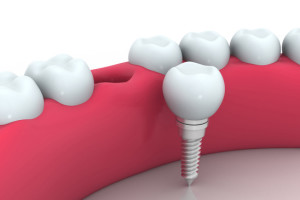
Dental Implants and Cavities
Dental implants are made of metal and porcelain or another tooth-colored substance. The metal is either titanium or a titanium alloy, because bone creates a natural bond with this type of metal. The bond between the bone and the implant means the implant remains stationary and helps prevent atrophy in the jawbone by stimulating it to grow. Without this stimulation, the bone is naturally resorbed into the body, causing the shape of the jaw and the face to change over time.
Because they’re made of artificial materials, implants can’t decay. However, they can collect bacteria, plaque, and tartar just like your natural teeth. Therefore it’s important to keep them clean. You should also visit your dentist regularly to have your gums evaluated for any signs of gingivitis or gum disease. Many dentists suggest that you should have more frequent regular cleanings when you have implants to avoid gum disease.
Caring for Dental Implants
Implants should be brushed just like normal teeth. If your implants anchor a removable denture, you should clean the denture regularly, as well. Floss around the abutments—the part of the implant that supports your denture or your prosthetic tooth. Your implant dentist will provide instructions regarding proper care—be sure to follow them closely to keep your teeth and mouth healthy.
In addition, it’s important to keep any remaining natural teeth clean and healthy. Though the implants themselves can’t decay, they can spread bacteria to your natural teeth, causing them to develop cavities. So regular brushing and flossing are vital to maintaining your overall dental health. If you notice any problems with your gums or your teeth, be sure to discuss this with your dentist, as issues with the gums could affect the long-term success of your implants.
If you’re interested in replacing your teeth with dental implants, call our team today to discuss your options!